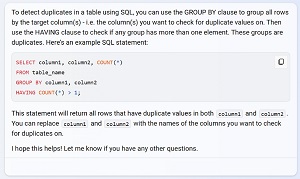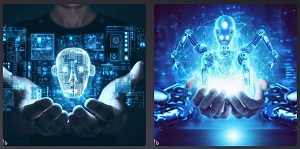In-Depth
How Will AI Impact Technical Jobs? Our Experts Offer Their Opinions
- By Pure AI Editors
- 07/06/2023
Three Pure AI technical experts got together and discussed how AI might affect eight different technical job categories. Somewhat surprisingly -- to the experts -- they reached a general consensus that seven of the eight job categories could likely be impacted sooner rather than later.
Since the recent release of ChatGPT, DALL-E and similar AI tools, dozens of articles in popular media have been published that speculate about how AI will affect different types of jobs. Put more bluntly, these articles forecast which jobs will be eliminated by AI.
Three Experts and Eight Job Categories
In much the same way that the spread of the internet in the 1990s made it clear that some types of businesses would be immediately and dramatically affected -- think bookstores and newspaper publishing -- the rise of AI clearly puts some job categories in immediate risk of drastic change. Examples include phone support jobs, text summarization jobs, paralegal jobs and language-to-language translation jobs. But the real issue is not about which jobs will be affected by AI, but rather how much AI will affect job categories and how soon.
Pure AI asked three of our technical experts to comment on how AI might impact jobs in the technology sector. The experts discussed eight job categories: software documentation and localization; SQL database design and reporting; web and mobile application development; data analysis; gaming and UI design; project management; testing; and system security.
Our three technical experts work as AI scientist engineers at three different, very large tech companies. All three have worked together at one time or another, and each has more than 10 years of experience in AI. Additionally, each expert has experience working on software systems in a production environment. We label them anonymously as Experts A, B and C so that their opinions can be expressed freely.
Our three experts agreed upon three themes:
- Speculation about how jobs will be affected by AI is just that -- speculation.
- Because early breakthrough AI systems are based on natural language processing, jobs that involve human text will most likely to be affected soonest.
- It's unlikely that many job categories will be eliminated entirely even though the number of positions may decrease drastically.
Three Job Categories Close to Natural Language Processing
Software Documentation and Localization: Expert A commented, "Software documentation jobs are clearly in the AI crosshairs. Current systems are already capable and effective." Expert C added, "Software localization jobs, for example translating systems written with an English language user interface into Japanese, are another obvious target." Expert B chimed in that, "I think it's likely that AI will greatly increase the availability of application software to smaller countries where manual localization isn't financially feasible."
 [Click on image for larger view.] Figure 1: Generated by "Show Me SQL Code to Detect Duplicates in a Table" Prompt
[Click on image for larger view.] Figure 1: Generated by "Show Me SQL Code to Detect Duplicates in a Table" Prompt
SQL Database Design and Complex Queries: Expert B said, "Because SQL is a closed system in a sense, with decades of high-quality examples, AI should be able to design efficient databases and generate complex queries." Expert A noted, "When I talk to SQL experts at my workplace, they unanimously push back and say they don't believe AI can tackle their jobs." The expert suggested, "I think that there will be a significant human psychology aspect to the rise of AI; experts in a domain will balk at accepting the idea that their area of expertise can be handled by AI."
Web Application and Mobile Application Design: Expert C said, "I think web application jobs will be significantly reduced over time. I believe that any job that lends itself to a software framework, such as Angular for web applications, can eventually be tackled well by AI." Expert B agreed and added, "A web framework is essentially a high-level abstraction over HTML, CSS and JavaScript code. Most things that can be abstracted in such a way are candidates for AI automation." Expert A noted, "I agree with my colleagues and think the ideas extend to mobile phone application development too."
Two Job Categories Close to Data and Image Processing
Classical Statistics and Data Analysis: Expert A suggested, "I strongly suspect that analysis jobs which use classical statistics to analyze data can be dealt with by AI systems. In fact, it's likely that AI data analysis can achieve super-human results." Our expert added, "I have decades of experience with classical statistics and there are still nuances I don't fully understand. AI can quickly learn what it would take a human many, many years to master."
 [Click on image for larger view.] Figure 2: Generated by "Give Me an Image of AI Creating AI" Prompt
[Click on image for larger view.] Figure 2: Generated by "Give Me an Image of AI Creating AI" Prompt
Gaming and UI Design: Expert B has significant experience with game development. He stated, "I think it's clear that AI will have an enormous impact on game design and development. But I'm not entirely sure how AI systems for gaming will be used." He continued, "I can imagine feeding a comprehensive text document that describes a virtual world in great detail to an AI system, and then the AI system can generate a complete game system." All three experts tempered enthusiasm with comments like, "But humans will have to be in the loop for game design because subtle nuances can have a profound effect on playability."
Three Other Job Categories
Technical Program/Project Management: Our experts did not come to a clear consensus on how AI might affect technical program management. All three experts are humanists to some extent. Expert A stated, "Program management is a very subjective skill. For example, it's not enough to drive project schedules and deliverables. It's just as important to monitor enthusiasm, signs of burn-out, and interpersonal relations. I don't think AI is ready for these tasks yet." Experts B and C are a bit more optimistic, agreeing with Expert A but also thinking that a human manager could greatly benefit from an AI system that handles quantitative aspects of a project.
Software Testing: Expert C, who has significant software testing experience, gave a strong opinion that, "Software testing is an area where it's possible nearly all human jobs can possibly be eliminated." Expert A added, "It's true that there's an aspect of creativity involved in software testing, but AI could eliminate manual software testing."
System Security: Our experts generally agreed that security is an area that is difficult to predict but one which has enormous potential. Expert B observed, "It's hard to even define exactly what system security means because it touches every possible aspect of a software system." Expert A added, "AI has not been entirely successful at tackling security. But an AI system that can oversee many aspects of security over a large system could be nothing short of revolutionary."
Wrapping Up
What about AI development? In other words, will AI systems create ever-increasingly sophisticated AI systems? The three Pure AI experts generally agreed that this is a genuine prospect. Two of the three experts believe super AI systems pose a small, but plausible, risk to humanity. The third expert was less pessimistic, saying, "Just as the Internet created some extremely toxic effects on society, super AI systems will likely do so too. But just as Internet toxicity can be dealt with, super AI systems can be dealt with too."
The experts were unanimous in cautioning that they suspect legal and regulatory issues will restrain the growth of super AI systems more than technical issues will.